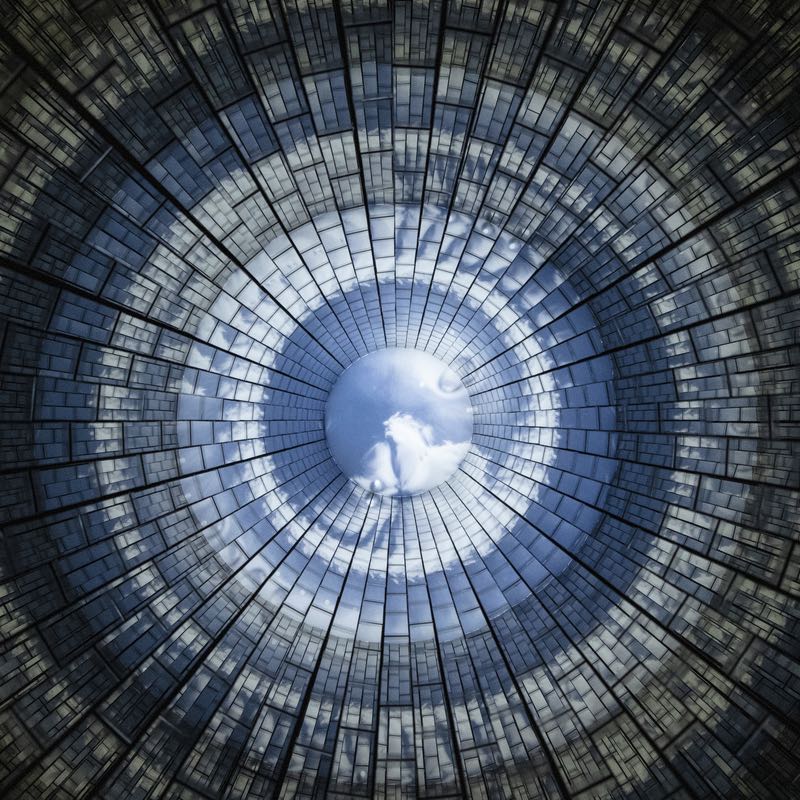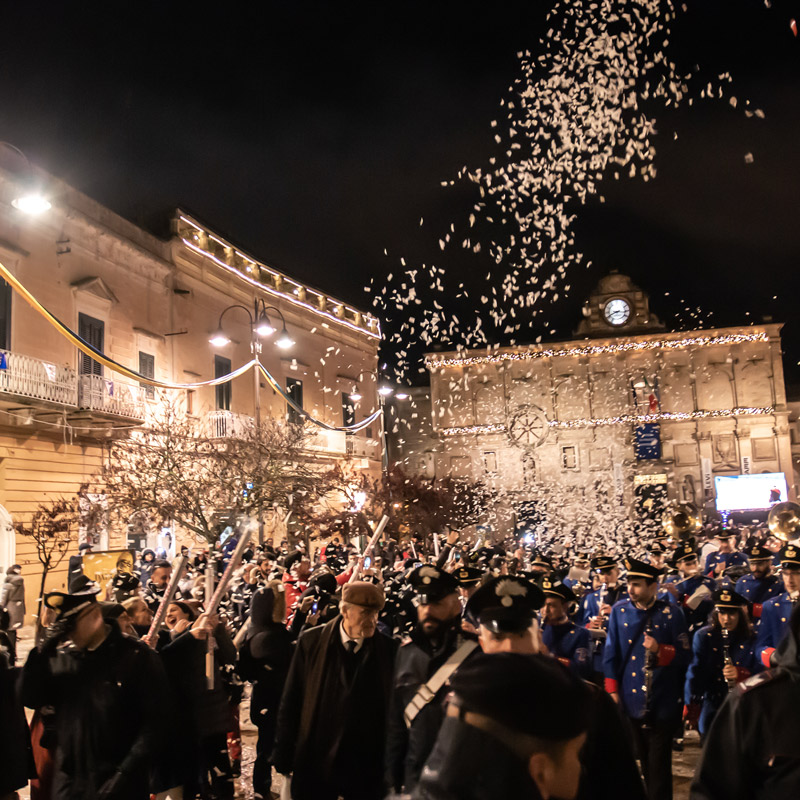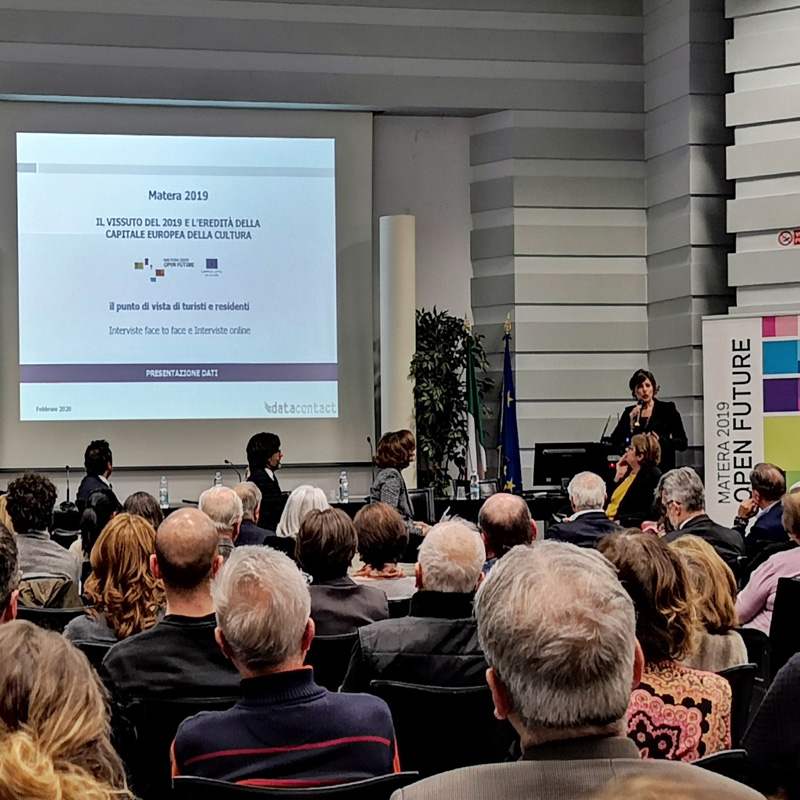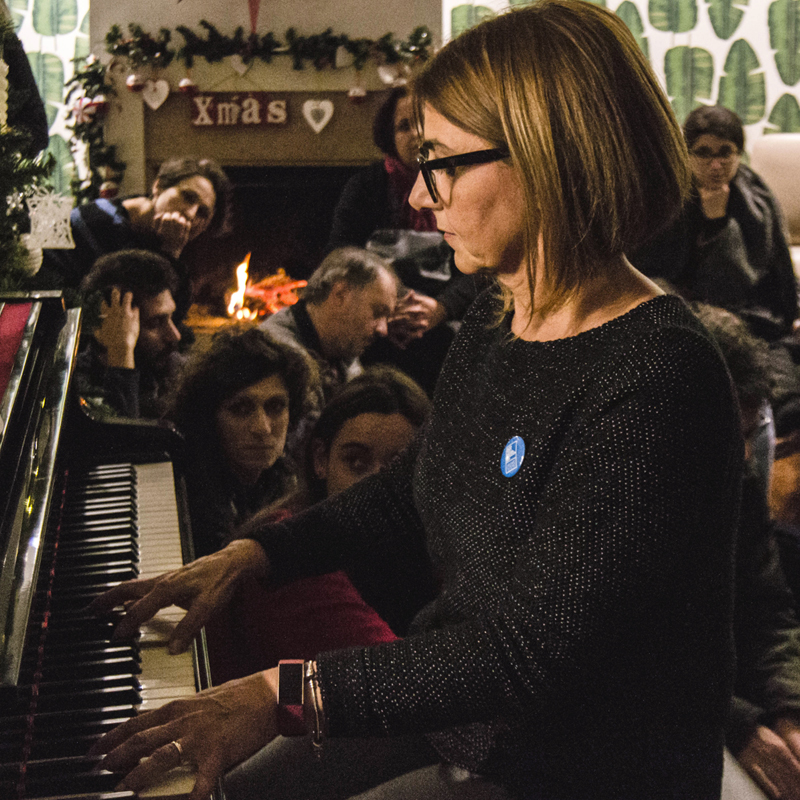Home
Diary of an encouter: Matera 2019 and Eu Japan Fest

"Diary of an encouter (Diario di un incontro)" is the title of the publication, available in Italian, English and Japanese, in which we wanted to bring together all the initiatives carried out for Matera European Capital of Culture 2019 together with our partner EU-Japan Fest, a Japanese association of private companies that for 30 years has collaborated with all European Capitals of Culture to create opportunities for exchanges and shared work between Japanese and European artists.
Not just a meeting between artists, but between cultures, between populations and, ultimately, between people. The most emotive images of this meeting, which can be seen by browsing the catalogue, primarily portray the smiles and kindness of the Japanese volunteers who arrived in Matera with the Volunteers Exchange programme. Our friends have shown incredible enthusiasm in making their contribution to some important Matera 2019 projects, while at the same time finding a great welcome among the local volunteers and the Matera community.
And then there are the cultural productions, which involved many artists from Japan: the actress Ema Tashiro in the show 'Humana Vergogna', part of the project 'Poetry of Shame' co-produced by #Reteteatro41; the artist Kaori Kato in the workshops on paper and the creation of installations for 'M.E.M.O.RI. - The Euro Mediterranean Museum of Re(f)used Objects' co-produced by Luna al guinzaglio; the juggler and contortionist Hisashi Watanabe, of the Atama to Kuchi company, on stage with 'Inverted Tree' as part of the project dedicated to the contemporary circus 'Circus +'; the artist Takashi Kuribayashi, with his two artistic installations 'Entrances' and 'Cielo Capolvolto'; the multimedia artist Ryoichi Kurokawa with his audiovisual performance 'Subassemblies' for the 'In Vitro - Artificial Sonification' project co-produced by LOXOSconcept; the artist Hiroaki Umeda in the digital art and dance performance 'Intensional Particle' for the 'Quantum Danza' project; the architect Gakutoshi Kojima, who in 1974 participated in the international competition for the recovery of the Sassi stone districts, protagonist of a design workshop and a talk organised by the Open Design School.
Through the 'City Pop Up' project, Open Design School also hosted the Solar Cooking Club workshop with Japanese architects Yoshiharu Tsukamoto and Momoyo Kaijima of the Atelier Bow Wow studio, while for the Artistic Residencies project, thanks to the collaboration with the Basilicata Chamber of Commerce, the Japanese artist Yu Arak, who has worked with the network of companies linked to Casamatera, came to Matera. Another artistic residency was that of the 'European Eyes On Japan' project, which brought photographers from the European Capitals to Japan, observed through the shots taken by a ‘European eye’, and the 'Passport Programme', a joint programme of cultural exchanges between artists and culture experts from Basilicata and Japan.
All of the above and other content are included in this volume that we have created as a sort of diary in verse, disseminating between the pages, triplets, in homage to the tradition of Japanese haiku, written by Edoardo Delle Donne, the Basilicata author of the 'Manifesto for Matera', an emotional map in eight points from which the artist Kuribayashi obtained the verses that constituted the verbal material of his installation 'Cielo Capovolto'.
Meetings that are intended for deeper bonds and exchanges. Because a meeting is not only in the moment, it lasts over time... people to people! Diary of an encouter (Diario di un incontro) / Catalogue
Diary of an encouter (Diario di un incontro) / Catalogue
Matera 2019 and Google Arts & Culture

11 December 2019 and 21 February 2020. Two dates that are reference points for months of research, assembly and construction of the story of stories, that of a wonderful journey to be preserved and shown to the world. The faces, the projects, the spaces, the workshops, the exhibitions, the events, the emotions: all that has been Matera 2019 is today part of the large open window on the Google Arts & Culture platform, an immense online museum where you can retrace the extraordinary year of Matera European Capital of Culture 2019, reading about it from exclusive and emotional points of view.
Matera 2019 is the first European capital of culture to be present on the Google Arts & Culture platform, alongside the most prestigious cultural institutions in the world such as the New York MoMA, the Palace of Versailles and the Venice Biennale.
The presence of Matera 2019 on the platform developed by Google to promote and preserve online culture does not simply aim to tell the material heritage of the city, but above all to enhance the stories and processes that accompanied the 2019 initiatives.
Unlike other institutions, in fact, we worked and concentrated on the processes and stories that made this exponential global visibility in the cultural field possible. The narrations are therefore dedicated to the volunteers and citizens that were the protagonists of cultural productions, to national and international artists who have enriched the cultural offer, to large and more immersive exhibitions, to film productions, to the Cava del Sole that became a vessel for all the music of the world, to the great workshop of Matera 2019, to underground Matera (the productions hosted in the underground spaces), to the expanded city (the activities in Piccianello, in the village of La Martella, Serra Venerdì, the quarries, the Murgia, the prison, the Tre Torri Theatre), to the whole of Basilicata, which in 2019 lent itself to welcome and produce various cultural and creative processes, to the Sassi stone districts as a stage for the European capital of culture (Inhabiting the Opera, Open sound, Heritage Games, Matera Alberga, to name a few) to the great co-productions (Rai Radio3, Teatro San Carlo, Teatro delle Albe, etc.), to the murals that today colour the centre and the periphery (but not only) of the city of Matera.
After the launch of the dedicated page and the first stories, which took place in December 2019, in February 2020 the narrative process was complete, enriched with other stories and elements, of which people and places are the protagonists. Many multimedia pieces and routes mapped for the first time with Street View, with added photographic and video content, dedicated to the events of the Matera 2019 cultural programme, for a total of 519 elements accompanied by a narrative available in Italian and English, for a highly representative story of the major thematic strands of Matera 2019.
An important result therefore, the result of a great collaboration between the digital communication team of Matera 2019 and the editorial staff of Google Arts & Culture, who have approved all the proposed content, confirming both the quality of the materials and the choice of storytelling method.
Connections and Reflections: presentation of the survey on perceptions of Matera 2019

2019: an extraordinary year lived intensely. But what was the perception of permanent and temporary citizens who took part in the Matera European Capital of Culture journey?
On 19 February 2020, in the Conference Room of the Basilicata Chamber of Commerce in Matera, during a meeting aimed at 'Connections and Reflections' there was a presentation of the results of a survey commissioned by the Matera-Basilicata 2019 Foundation and carried out by the company Datacontact, which provided useful and important food for thought and the stimulus to take on new challenges, areas for improvement and opportunities arising from the legacy left behind by this great event.
Based on a sample of almost 5000 permanent and temporary citizens, both from Italy and abroad, who were asked to complete a questionnaire either face-to-face or online, it immediately catches the eye that almost all of the interviewees now believe that Matera is a more international and well-known city, compared to the pre-candidacy phase, whilst 77.9% consider it to be more culturally vibrant. There are also important data that highlight how around 85% of citizens have taken great pride in the path taken by the city, with 87.4% and 82.5% who are now open and willing to welcome both tourists and citizens coming from other cities or countries, and those with different abilities.
Furthermore, 60% of the interviewees felt sufficiently involved as a protagonist and not only a spectator of the cultural programme, a feeling that has increased the desire to personally take part in the future, and around 70% of the respondents have stated that, thanks to the Matera Passport 2019 (the cost of which was considered by the majority as fair if not negligible compared to what was on offer), they felt more motivated to participate in the events and activities of the cultural programme. Indeed, 83.5% said that the Passport also helped to bring more spectators to the cultural events in general, broadening the horizons of the public and attracting those who did not usually attend this type of event.
Richness and variety, as well as originality, are the most suitable adjectives to describe the perception of the content proposed by the cultural programme, which corresponds to an appreciation for the enhancement of new spaces (such as Cava del Sole), the unprecedented use of some (Matera prison, for example) or the rearrangement of others (especially the museums). The survey, in fact, shows that 85.9% of the most attended events were exhibitions, 73% were shows and performances (theatre, opera, dance) and 64.3% were concerts and events at Cava del Sole.
In addition to widespread sadness for the intense year that has just ended and that many would have liked to continue (31.7%), the most perceived feeling is that of happiness for having had such an exceptional experience (36.8%): these feelings, in fact, affect almost 60% on average of citizens who are hoping for a future in which Matera and Basilicata remain places where culture is produced and where international events are still organised. There is a hunger for shows, music and events at the Cava del Sole, a desire for exhibitions, opera and theatre, and a strong hope of even more engaging activities for young spectators.
It is also important to note that the year of Matera European Capital of Culture influenced 68.1% of the choice of the city as a holiday destination, significantly increasing the number of temporary citizens in the city. The results of the survey on the perception of Matera, European Capital of Culture 2019
The results of the survey on the perception of Matera, European Capital of Culture 2019
'Altofest - Abitare Futuro' is turning space upside down

Altofest is the story of an original and provocative response to the theatre crisis. Faced with a continuous decline in audience numbers, in Naples, the intention was to deconstruct the idea of theatre space, and to strip it down to its bare bones, taking it to private homes. Thus, Altofest was born, a festival that brings the artist to the spectator's most intimate place and transforms their house into their home theatre.
This initiative subsequently gave rise to 'Altofest-Abitare Futuro', a special edition, conceived for Matera-Basilicata 2019, of this work-system that fits neatly into the socio-urban fabric. From 4 November to 8 December, for two weeks each, 29 artistic residencies involved the municipalities of Melfi, Venosa, Moliterno, Sarconi, Montalbano Jonico, Tursi, Tricarico, Grassano, Montescaglioso, Miglionico and Matera, to testify how much interest the internal areas of the region continue to hold for Matera 2019. Of these residencies, 27 took place in the private homes of Basilicata citizens and 2 in 'special venues': a pool hall and a school bus. Over 2,500 spectators had the opportunity to witness the staging of works by national and international artists, known in the most diverse fields, from dance to videomaking, from theatre to music.
The concept behind the whole festival was the exchange relationship between the host family and the artist. Citizens became 'space donors' whilst the artists edited their work based on the space in which they were living, and the interpersonal relationships established with the hosts. From this perspective, the family unit was a comparative element for the artist, allowing or denying the distortion of the space around and, sometimes, constituting as an integral part of the work.
This was not just because of hospitality but also constant dialogue, which reached its maximum potential in the open debates organised around the tenth day of the residency, on the eve of the artist's final performance/restitution. In these moments of exchange, it was highlighted how, quite unexpectedly, the residencies stimulated a common aesthetic reflection on the performances and on the act of restitution itself.
It now remains to be seen what precious heritage 'Altofest-Abitare Futuro' has created in terms of relationships and the building of communities and, above all, how not to waste their potential.





